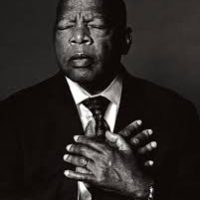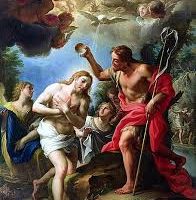Before I moved to California almost 24 years ago, I was going through a pastoral residency program back in Northern Germany, and I lived in a small rural community called Dötlingen. Now Dötlingen was and still is a picture book kind of village, with an oak tree in the village center that is more than 1,000 years old, half-timbered farmhouses, a church dating back to the 12th century, and gentle juicy meadows where one can see happy cows graze contentedly. There wasn’t much going on in Dötlingen – the next town with stores, doctors’ offices and gas stations was about 7 miles away – but it sure was idyllic, almost ridiculously so. It was like living in a postcard.
We lived on the edge of the village, next to some fenced in meadows set aside as flood planes for a nearby small river. Every year in the late summer, these meadows would be populated by sheep – which only added to the charm of this bucolic village.
One fine morning, I woke up to the sound of sheep baaing – the very LOUD sound of sheep baaing, to be precise. I was wondering what was going on, so I drowsily moved to my bedroom window –and discovered that our and our next door neighbors’ yards were overrun by dozens of sheep, who happily chomped away on flowers, decorative shrubs, and manicured lawns. Those sheep must have found a hole in the fence and escaped – or maybe even created a hole themselves.
(And, no, this is not a picture I took back then, – that was long before phone cameras existed which you can just whip out – but I wanted to give you an approximate idea what that looked like.) Imagine your yard was invaded by a flock of sheep!
It was mayhem. Who knew that these creatures, who are usually depicted as docile and gentle, can be so destructive?
My poor neighbors, who really had the most beautiful garden – that is, before the sheep got into it -, tried to shoo the sheep out of their yard, prodding, pushing even – to no avail. Sheep, it turns out, can be really stubborn – and there is strength in numbers!
Eventually, a shepherd showed up. And even then, the sheep didn’t even think about leaving their tasty smorgasbord. It took the nipping of two sheep dogs, plus a good whacking with the shepherd’s staff, to drive the flock back into the meadows.
This was the closest encounter I ever had with sheep. And this encounter made me look at sheep in a new way. Sheep are resilient and resourceful. As part of the flock, sheep are not as helpless as they seem. And sheep can be trouble – without a good shepherd, they can wreak havoc.
This whole episode also made me look differently at the stories about sheep in our Holy Scriptures. There definitely is a darker side to the idea that WE are the sheep of God’s flock. There are good reasons why we need someone to lead us and keep us from not only getting into trouble, but from being trouble.
All the lessons we heard today mention sheep – with the understanding that God’s people are the flock. And it is interesting that we have three different kinds of scenarios: we move from good shepherd to bad shepherd to no shepherd. In the psalm, we heard the familiar words about God, the good shepherd, who takes care of me. In the lesson from Jeremiah, we heard about bad shepherds, who lead the flock of God’s people astray, scatter them, and abandon them. And in today’s gospel, Jesus looks at the crowds of people craving for healing of body, mind, and soul – sheep without a shepherd.
God is the good shepherd. The Bible is clear about that. God has best intentions for the flock. God truly cares – and goes the extra mile and makes the extra effort to care for the sheep. Every sheep is important to God – the strong, the weak, the young, the old, the docile ones, the difficult ones.
The same cannot be said about human shepherds, human leaders. The prophet Jeremiah was aghast that the political leadership of the Kingdom of Judah would lead their entire people into disaster. And I could talk hours about what the king of Judah and his advisors did wrong; but, in a nutshell, they misjudged their importance and standing in the Middle East. The consequences were dire: Jerusalem and the entire kingdom of Judah were sacked by the Babylonians in the year 587 B.C.E., and most people were led into exile – the quite infamous Babylonian Exile. Talk about a scattered flock!
Human beings tend to be curved into themselves, as Martin Luther so famously said. Humans tend to be selfish and try to work things out for their own advantage – or the advantage of their kin. How many bad shepherds, how many tyrants has this world seen! And most leaders today, be they political leaders or economic leaders or even religious leaders, don’t really give a hoot about the people they lead, even though they pretend to. Look at Washington D.C., for example – it’s all about power and ego. Look at the super billionaires, who could solve many problems of this world by sharing a tiny fraction of their wealth with others, but have become addicted to accumulating more and more wealth for themselves. Inequality of power, inequality of wealth is becoming more and more rampant every moment – in this country and around the world. Jeremiah, as so many other ancient and modern prophets, is quite right to look at human leaders critically. Sheep, beware and stay on your toes!
Good shepherd, bad shepherd – that makes sense. But it is quite curious that Jesus looks at the crowds who come to him, thinking they are like sheep without a shepherd. Well, from the standpoint of human leadership, it makes sense – the political and religious leadership in Galilee and Judah in Jesus’ days was de facto powerless, dancing a very careful dance with the Roman occupiers. But where is God, the good shepherd?
Well, the easy answer would be that God, the good shepherd, now has arrived in Jesus Christ. Jeremiah’s prophecy that a righteous and good shepherd would come out of the House of David has been fulfilled. But I don’t want to go there – yet.
Why do the people flocking to Jesus, hungry for healing, hungry for a word of hope, seem to be even without God, the good shepherd? We can only speculate – and let’s presume that God, indeed, is the good shepherd who would never abandon and give up on the flock.
Did the people turn away from God? And if so, why? Did they think they don’t need God shepherding them? Were they putting their trust in worldly leaders or worldly things instead? Didn’t they like the direction the shepherd was taking them? Maybe they just didn’t want to be part of a flock, codependent on God and each other? Did someone, did some power drive them away from God?
Or did they feel abandoned by God – after all, they were living under quite difficult, and some may say hopeless circumstances, at the cruel whim of the powers of the day? Had they forgotten that there is God, the good shepherd – because no preacher, no prophet was telling them about this good shepherd and God’s loving and holy will and vision for the people?
You probably can tell that I am asking all these questions as someone living in the post-modern – and some would say post-Christian – age. What keeps people – what keeps us – today from trusting and truly following God, the good shepherd?
Why are we as the human race on that immensely destructive – and ultimately self-destructive – track that doesn’t lead to life to the fullest that God intends for us and for all, but to death? Why are we, God’s flock today, like those sheep in my backyard 24 years ago, not content with what we have, but constantly yearning for more, wreaking havoc, and too stubborn to listen to the shepherd’s voice? Why do we in general need a whacking or a painful nipping – like a pandemic or a major catastrophe – to change direction, and if only for a moment?
In the gospel, Jesus Christ becomes the shepherd for the lost flock. He cares for everyone. He refuses no one. He heals people and gives them hope. He restores them to life – the life God intends for all of them. He reminds them that they are part of a community, in which everyone looks out for the other and everyone protects the other. And that includes the young and the old, the strong and the weak, the docile ones and the difficult ones. Jesus reminds them that community makes them stronger and less vulnerable.
Today we still need this shepherd. Because there are many who follow anyone and anything but Christ. We need focus. We need healing. We need protection from the evil forces and bad shepherds in this world. And we need to be protected from our very own destructive and self-destructive paths. God, the good shepherd, is there, patiently waiting for us to turn around and follow – towards God kingdom and into life. Amen
This post is also available in: German






